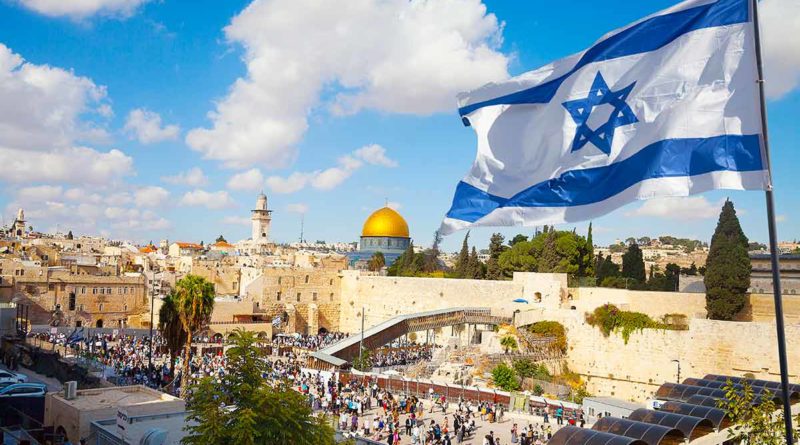Trump Recognizes Jerusalem as the Capital of Israel
Last week, President Donald Trump broke with nearly 70 years of American foreign policy by officially recognizing Jerusalem as the capital of Israel and set in motion a plan to move the U.S. Embassy from Tel Aviv to Jerusalem.
Since the 1979 Camp David Accords, previous presidents have refused to recognize Jerusalem as the capital of Israel or move the U.S. Embassy. The Camp David Accords served as a resolution framework for a comprehensive peace between Israel and the Arab states negotiated between Israeli prime minister Menachem Begin and Egyptian President Anwar Sadat with President Jimmy Carter serving as the go between. The Accords called for all the parties to complete peace treaties under its principles and were based on the United Nations Resolution 242, which was passed in the wake of the six day war in 1967 as an effort to secure lasting peace between Israel, Egypt, Jordan, and Syria.
While the Camp David Accords were a historic step in the right direction, it would not be until the Oslo Accords in 1993 that an agreement to end the Israeli-Palestinian conflict would be reached. Through a series of agreements on everything from territorial concessions to the creation of the Palestinian Authority, the Oslo Accords served as a launch pad into final talks with the hopes of reaching a longstanding agreement.
However, some issues were reserved for final status talks, such as borders, Jewish settlements, the return of refugees, and the state of Jerusalem. The timeline for final status talks were slated to begin in 1997, three years after the inception of the Oslo Accords, and a deadline of two years would be set for an agreement to be reached.
America’s continued impartiality throughout the Camp David Accords and the Oslo Accords set the precedent that Jerusalem’s status should be negotiated between the Israelis and Palestinians.
Historically speaking, America has spent the past 20 years serving as an impartial actor to bring both parties to the table with the hopes of reaching an agreement that is in the best interest of both Israel and Palestine. And yet, within a matter of moments, Trump squandered our nation’s role as intermediary by officially taking sides on a centuries long battle.
To say this news rocked the international community is an understatement. Trump’s declaration ignited a fire storm from Western allies and angered much of the Arab world. Arab League foreign ministers are calling the decision illegitimate and unlawful; and the shift in U.S. policy has undermined Arab confidence in the Trump administration.
While Israel’s prime minister Binyamin Netanyahu expressed his delight and gratitude, not everyone in the international community shared his sentiments. According to Mahmoud Abbas, the Palestinian president, “it rewards Israel for denying agreements and defying international resolutions, and encourage Israel to pursue the policy of occupation and settlement.”
Fulfilling a campaign promise, the Trump administration affirms this move and says it aligns with reality since most of Israel’s government is in Jerusalem. Considered by the UN a corpus separatum — a separate entity under international jurisdiction — Israel is the only country with a capital not formally recognized by the rest of the world.
The historic move falls in line with Trump’s overarching goal to broker peace in the Middle East. However, the reality is Trump’s declaration regarding Jerusalem has muddied the waters and undermined all peace efforts.
From the campaign trail to the Oval office, Trump has been outspoken in his support for Israel and his promise to achieve the “ultimate deal”— peace between Israel and the Palestinians. However, some Palestinians believe Trump’s declaration of Jerusalem as the capital of Israel will disqualify America from having any real role in the peace process.
Even though Trump made a dramatic shift in policy, the administration assures everyone that it does not mean he believes Israel has full claim to Jerusalem, but rather thinks that should be decided during peace talks. This works for Israel, but Palestine is not fully sold, especially since possession is nine-tenths of the law. Not to mention, throughout the peace talk process Palestine has insisted part of Jerusalem should serve as the capital of a future Palestinian state.
The jury is still out on if peace talks between Israel and Palestine will resume, but judging by the protests by Palestinians, the hopes for a two state solution and peace in the Middle East may still be a ways off. Trump’s reversal of decades of American policy is viewed by the Arab world as poor judgement, and has the potential to further deepen tensions in the area, causing more violence to break out in the region.
At the end of the day, Trump’s recognition of Jerusalem runs the risk of causing more unrest in the area, not to mention he has single-handedly barred America from having any hand in the peace process as far as the Palestinians are concerned. Going forward, this will make it extremely difficult to bring both Israel and Palestine back to the negotiating table. The need for a two state solution between Palestine and Israel is necessary, but it remains to be seen if it is viable, especially with America being viewed as persona non grata among an entire population.

